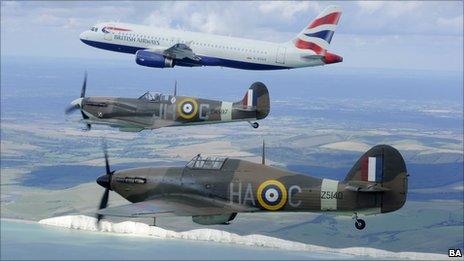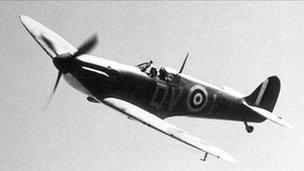Battle of Britain veterans take to the skies again
- Published

A Hurricane and Spitfire on a commemorative flight alongside an Airbus A320, part of the Battle of Britain 70th anniversary celebrations
Fourteen Battle of Britain veterans have taken to the skies in a special memorial flight.
The chartered airliner flew over parts of England and the English channel that saw some of the fiercest aerial combats.
The British Airways Airbus was accompanied for part of the way by a Spitfire and Hurricane from the period.

Spitfire fighter planes played a decisive role in the Battle of Britain
The battle for air supremacy between the RAF and the Luftwaffe in 1940 was a decisive chapter in World War II.
Important battle
The daily dogfights in the skies of southern England saved Britain and averted a German invasion.
Flight Lieutenant William Walker, the eldest veteran at 97, told the BBC on his return: "It really was a great day, a very special occasion.
"It was a marvellous sight to see a Hurricane and Spitfire flying, the sun glinting on them above the clouds. The Spitfire is the most exciting plane to see. I would love to fly one again."
Bill Bond, of the Battle of Britain Historical Society, who organised the two-hour flight, said that with just a few remaining veterans still alive he had wanted to mark the 70th anniversary celebrations with "something a bit special".
Before taking off for the flight he told the BBC that with the Hurricane and Spitfire flying alongside the British Airways Airbus, it "would be the first time that any of the veterans had flown in formation since the end of the war".
Another of the veterans, Wing Commander Bob Foster, said the flight was an important reminder to those who were not born at the time as it "would bring home to (them) what happened way back 70 years ago".
"This is what we are trying to get over to the younger generation, the importance of the battle fought then."
The plane, which also carried 15 widows of Battle of Britain pilots, flew across the Home Counties, the Isle of Wight, northern France, the Netherlands and parts of the North Sea.
Bailed out
These areas were the main arenas of the Battle of Britain. It was over the English channel that Flt Lt Walker was shot down in 1940.
Based at an airbase in Surrey, Flt Lt Walker was often sent up two or three times a day. On one such mission he, along with two other planes, was scrambled to meet the enemy. They soon came under attack and his Spitfire was shot at by a Messerschmitt 109, the main German fighter plane.
"My leader was shot down and badly burnt, my number two was killed and I got a bullet in my leg and my plane was shot to pieces. I bailed out at 20,000 ft," he recalled.
As he gently descended he removed his boots, blew up his Mae West life jacket and landed in the water close to a wreck on the Goodwin Sands just off the Kent coast.
He was rescued by a fishing boat and taken to Ramsgate, where he was met by a crowd.
"They cheered as I came ashore and a dear old lady gave me a cup of tea," he said.
Suffering from hypothermia, he was taken to hospital where he underwent an operation to remove a bullet from his ankle. When he woke up, a doctor was by his side.
"He had a bullet in his hand and told me that when the surgeon prised it out of my ankle it flew out and hit the ceiling. He gave it to me and I still have it as a treasured possession," he told the BBC.